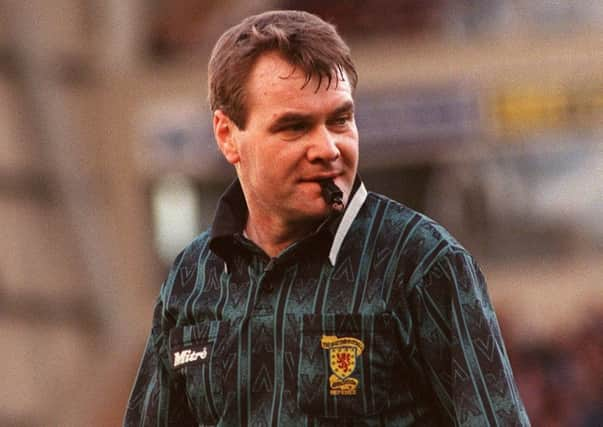Obituary: John Fleming, Scottish referee official known for his diplomacy on the pitch


The death of the SFA’s top referee official, John Fleming, after a lengthy illness, has come as a body blow to the governing body, and in particular Scotland’s family of match officials.
Quiet man Fleming succeeded the high-profile Hugh Dallas in 2011, but he quickly won the admiration and respect of everyone he met in his onerous post. His tenure in his SFA job was made more difficult by his own ill health, but he carried on stoically, even continuing to work from his hospital bed.
Advertisement
Hide AdAdvertisement
Hide AdBut we would expect nothing less than true grit and application from a man who was born, raised and spent his entire life in the East End of Glasgow. They breed them tough in Shettleston and Tollcross.
Those areas also breed a love of football. John Fleming was not immune, but his own efforts only took him as far as park football in the amateur ranks before, in his mid-twenties, he took the decision, to go over to “the dark side” and become a referee.
Then, as now, the apprenticeship was hard – fiercely fought pub and works games at Tollcross and Petershill Parks, or on Glasgow Green, before promotion to the even harder finishing school of Junior Football. But John Fleming took the blows, and in 1994, aged 36, he finally made it to Grade One, officiating at games at the likes of Ibrox, Celtic Park, Easter Road and Tynecastle.
However, Fifa and Uefa then decided to move the goalposts somewhat, bringing in the role of Specialist Assistant Referees.
John Fleming was one of the first officials to opt out of whistling to carry a flag, and in 1996 this decision paid off, when he was named as one of the four members of “Team Scotland” who were chosen to officiate as a team, at Euro’96.
The quartet of referee Les Mottram, assistant referees Fleming and Bobby Orr and fourth official Hugh Dallas impressed everyone during that final tournament and on the back of “football coming home”, John enjoyed frequent trips abroad and appointment to the big games in Scotland, prior to reaching mandatory retirement age for referees.
Throughout his active career he was, of course, a part-time official. The day job was as a BT telephone engineer, the job he had started as an apprentice on leaving school.
However, fate intervened when he had the chance of taking voluntary redundancy, just as an opening came up in the expanding SFA refereeing department – so John swapped telephone exchanges for the sixth-floor corridor at Hampden.
Advertisement
Hide AdAdvertisement
Hide AdIt was a role he had been auditioning for for years, almost as soon as he had established himself within the Glasgow Referees Association – a body he would eventually lead as president – John had been involved in referee training. For many years he ran the initial training classes, in which wannabe referees learn the basics of the role, before winning their SFA badge.
He was always supportive of young, up and coming referees.
His was a ready shoulder to cry on, and many a successful official has had cause to thank John for talking them out of quitting after a particularly fraught Saturday afternoon on a public park, or at a junior ground.
He was a highly regarded referee supervisor, assessing the man in the middle from his seat in the stand, and in this role his post-match debriefs were always concise and supportive.
Once he was installed at Hampden, he frequently had to take the flak from an unhappy, high-profile manager, rehashing and backing-up controversial decisions from matches. His patience in such matters won him huge respect from the managers – he had rare diplomatic skills.
Hugh Dallas losing his position in 2010 led to John taking over as Head of Referee Operations, and he made a great success of the job.
He decided to make referee recruitment and retention his priority, and did this brilliantly. He was particularly keen on encouraging female officials as that side of the game grew and delighted in seeing some of his girls being appointed to male games.
He also, given his background in telecommunications, helped establish refereeing in Scotland’s positive presence on social media.
However, beneath the surface, all was not well. His final years were blighted by a serious illness, the exact details of which he kept within his family. Seldom pain-free, he continued to work tirelessly toimprove the lot of his referees.
Advertisement
Hide AdAdvertisement
Hide AdThe loss of his devoted wife Ann, who died suddenly in 2016, was a further blow, but, supported by his family: son Graham, daughter Dawn and grandchildren Anna, Charlie and Rose, he carried on.
Refereeing was John’s passion, to which, other than the occasional game of bowls and precious time with his family, he gave everything.
He does not have the reputation of the men who went before him such as Jack Mowat, Tom Wharton, Bobby Davidson or Hugh Dallas, but, when, in a few years’ time, the history of the first 150 years of Scottish football is written, John Fleming will rate a favourable mention.
MATT VALLANCE